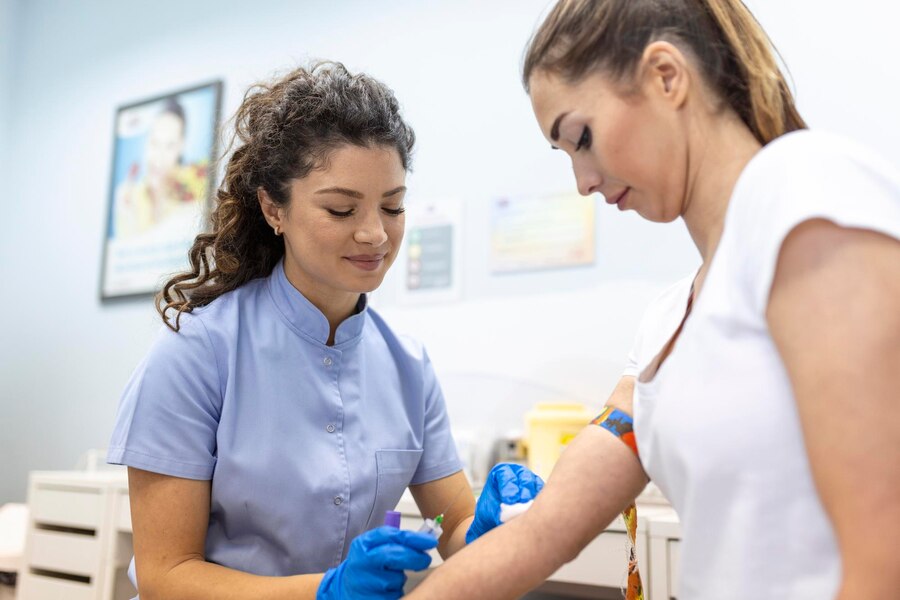Laboratory Testing for Cholesterol Levels Checks
Cholesterol testing, also known as a lipid profile or lipid panel, is a critical diagnostic tool used to measure the levels of cholesterol and related lipids in the bloodstream. These tests play a vital role in identifying cardiovascular risk factors, monitoring treatment efficacy, and guiding clinical decisions. This article delves into the nuances of cholesterol testing, covering its importance, methodology, and clinical interpretation.
Understanding Cholesterol Levels
Cholesterol exists in different forms:
- Low-Density Lipoprotein (LDL) Cholesterol: Often referred to as “bad” cholesterol, LDL cholesterol contributes significantly to the buildup of plaque in the arteries, increasing the risk of heart disease.
- High-Density Lipoprotein (HDL) Cholesterol: Known as “good” cholesterol, HDL cholesterol helps remove excess cholesterol from the bloodstream and transport it to the liver for processing and removal.
- Triglycerides:
- Triglycerides are another type of fat found in the blood.
- High triglyceride levels can also increase the risk of heart disease.
Why Regular Testing is Crucial
Regular cholesterol testing is vital for:
- Early Detection of Risk: Identifying individuals at risk of developing cardiovascular diseases.
- Treatment Monitoring: Assessing the efficacy of cholesterol-lowering medications and lifestyle interventions.
- Preventive Healthcare: Empowering individuals to make informed decisions about diet, exercise, and medication.
Types of Laboratory Cholesterol Tests
-
Lipid Profile:
- This comprehensive blood test measures the levels of total cholesterol, LDL cholesterol, HDL cholesterol, and triglycerides.
- It provides a comprehensive picture of an individual’s cholesterol levels and cardiovascular risk.
-
Fasting Lipid Profile:
- This test requires fasting for 9-12 hours before blood is drawn.
- It provides the most accurate assessment of cholesterol levels and is often recommended for routine screening.
-
Non-Fasting Lipid Profile:
- This test can be performed without prior fasting.
- However, it may not always provide the most accurate picture of cholesterol levels, especially for triglycerides.
Preparing for a Cholesterol Test
-
Fasting (if required):
- If a fasting lipid profile is required, it’s important to follow the fasting instructions carefully, typically 9-12 hours of no food or beverages except water.
-
Medications:
- Inform your healthcare provider about any medications you are currently taking, as some medications can affect cholesterol levels. Your doctor may advise you to adjust your medication schedule before the test.
Interpreting Test Results
-
Understanding Cholesterol Levels:
- The interpretation of cholesterol test results should always be done by a qualified healthcare professional.
- They will consider your individual risk factors, such as age, family history, smoking status, and other medical conditions, to assess your overall cardiovascular risk.
-
Desirable Cholesterol Levels:
- Desirable cholesterol levels vary depending on individual factors.
- Your healthcare provider will discuss your specific results and recommend appropriate management strategies.
-
Standard Reference Ranges
- Total Cholesterol: <200 mg/dL (desirable)
- LDL Cholesterol: <100 mg/dL (optimal)
- HDL Cholesterol: ≥60 mg/dL (protective against CVD)
- Triglycerides: <150 mg/dL (normal)
Limitations and Challenges
-
Biological Variability
- Cholesterol levels can fluctuate due to stress, illness, or recent dietary changes, impacting test results.
-
Accuracy of Non-Fasting Tests
- While convenient, non-fasting lipid panels may yield less accurate triglyceride and LDL measurements.
-
Laboratory Differences
- Variations in testing methods and calibration across laboratories can lead to minor discrepancies in results.
Maintaining Healthy Cholesterol Levels
-
Lifestyle Modifications:
- Lifestyle modifications are crucial for maintaining healthy cholesterol levels.
- This includes:
-
Healthy Diet:
- Consuming a diet rich in fruits, vegetables, whole grains, and lean protein.
- Limiting saturated and trans fats, cholesterol, and sodium intake.
-
Regular Exercise:
- Engaging in regular physical activity, such as brisk walking, jogging, or cycling, can help to lower LDL cholesterol and raise HDL cholesterol.
-
Maintaining a Healthy Weight:
- Maintaining a healthy weight through a combination of diet and exercise can significantly improve cholesterol levels.
-
-
Medications:
- In some cases, medications such as statins may be prescribed to lower cholesterol levels.
Conclusion
Laboratory testing plays a vital role in assessing cholesterol levels, identifying individuals at risk for heart disease, and guiding appropriate preventive measures. By understanding your cholesterol levels and working closely with your healthcare provider, you can take proactive steps to maintain healthy cholesterol levels and reduce your risk of heart disease.
Schedule an appointment with our laboratory testing services for detailed cholesterol levels check (469) 805-4561 or visit us https://specialtycareclinics.com/locations/fort-worth/
